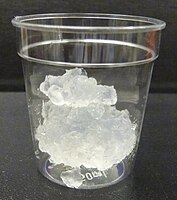
Photo from wikipedia
Purpose When establishing IVIVC, a special problem arises by interpretation of averaged in vivo profiles insight of considerable individual variations in term of time and number of mechanical stress events… Click to show full abstract
Purpose When establishing IVIVC, a special problem arises by interpretation of averaged in vivo profiles insight of considerable individual variations in term of time and number of mechanical stress events in GI-tract. The objective of the study was to investigate and forecast the effect of mechanical stress on in vivo behavior in human of hydrophilic matrix tablets. Methods Dissolution profiles for the marketed products were obtained at different conditions (stirring speed, single- or repeatable mechanical stress applied) and convoluted into C-t profiles. Vice versa, published in vivo C-t profiles of the products were deconvoluted into absorption profiles and compared with dissolution profiles by similarity factor. Results Investigated hydrophilic matrix tablets varied in term of their resistance against hydrodynamic stress or single stress during the dissolution. Different scenarios, including repeatable mechanical stress, were investigated on mostly prone Seroquel® XR 50 mg. None of the particular scenarios fits to the published in vivo C-t profile of Seroquel® XR 50 mg representing, however, the average of individual profiles related to scenarios differing by number, frequency and time of contraction stress. When different scenarios were combined in different proportions, the profiles became closer to the original in vivo profile including a burst between 4 and 5 h, probably, due to stress-events in GI-tract. Conclusion For establishing IVIVC of oral dosage forms susceptible mechanical stress, a comparison of the deconvoluted individual in vivo profiles with in vitro profiles of different dissolution scenarios can be recommended.
Journal Title: Pharmaceutical Research
Year Published: 2020
Link to full text (if available)
Share on Social Media: Sign Up to like & get
recommendations!